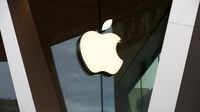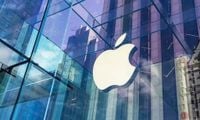Apple’s recent $95 million settlement in a class-action lawsuit regarding its Siri voice assistant has captured the attention of consumers across the United States. This legal resolution stems from allegations that Siri inadvertently recorded private conversations without user consent, raising significant concerns about privacy in the digital age. Eligible users have until July 2, 2025, to file claims for compensation, with payouts potentially reaching up to $100 for those who owned multiple Siri-enabled devices.
The lawsuit, officially known as Lopez et al v. Apple Inc., was initiated in 2019 and accused Apple of activating Siri without user intent. Plaintiffs claimed that Siri recorded private conversations, often triggered by phrases that sounded like “Hey Siri.” These unintended activations reportedly led to sensitive information being captured and, at times, shared with third-party contractors for quality analysis. Although Apple has denied any wrongdoing, the tech giant opted for this settlement to avoid prolonged litigation and further scrutiny.
For those eligible, the compensation structure is straightforward. Users can claim up to $20 per device, with a maximum of five devices allowed per user, totaling up to $100. This broad eligibility includes anyone who owned or purchased a Siri-enabled device between September 17, 2014, and December 31, 2024. Devices covered in this settlement include iPhones, iPads, Apple Watches, MacBooks, iMacs, HomePods, iPod Touches, and Apple TVs.
To file a claim, users are directed to visit the official settlement website, where they must enter their claim information, which includes their name, address, and details of their Siri-enabled devices. If users received a Claim Identification Code via email or mail, they can enter it for faster processing. The deadline for claim submission is July 2, 2025, and a final approval hearing is scheduled for August 1, 2025.
Since the lawsuit was filed, Apple has made several improvements to Siri’s privacy features, including enhanced privacy controls that allow users to opt out of audio recording sharing, secure storage of user recordings, and increased transparency regarding how data is collected and used. Apple maintains that it has not violated user privacy and that Siri recordings were never used for advertising purposes.
The origins of the lawsuit highlight the complexities surrounding voice-activated technology and its implications for personal data security. The plaintiffs argued that Siri’s unintended activations led to the collection of private communications, which were sometimes shared with contractors for quality control. Reports surfaced that Apple contractors listened to snippets of Siri recordings, leading to targeted advertisements for products discussed in private conversations, raising red flags about potential data misuse.
Despite these allegations, Apple has consistently denied any wrongdoing, emphasizing that its privacy policies prevent the use of Siri data for targeted advertising. The company stated that recordings were used solely for improving Siri’s performance, with human reviewers analyzing anonymized snippets as part of quality control. However, the lawsuit's scope grew, encompassing millions of U.S. residents who owned Siri-enabled devices over a decade.
The settlement, finalized in December 2024, reflects Apple’s strategy to resolve the matter without admitting wrongdoing, a common approach to avoid the costs and uncertainties associated with a trial. Since the announcement of the settlement, discussions about the balance between innovation and privacy have intensified, with privacy advocates urging stricter regulations on how companies collect and store audio recordings.
Public reaction to the settlement has been mixed. While some users appreciate the acknowledgment of potential privacy violations, others express disappointment over the modest payout, particularly after legal fees and administrative costs are deducted. The simplicity of the claims process has been praised, but challenges remain, especially for those who no longer possess their Siri-enabled devices. Users are encouraged to file claims early to avoid last-minute technical issues as the deadline approaches.
In response to the lawsuit and related concerns, Apple has implemented several changes to Siri’s operations. The company has shifted away from contractor-based reviews and introduced an opt-in policy for audio sharing, which gives users greater control over their data. Additionally, Apple has invested in on-device processing for Siri, which enhances privacy by keeping more data local and minimizing the need to send audio to external servers.
The legal and financial implications of the settlement are significant. At $95 million, it represents one of the largest privacy-related payouts in Apple’s history, though it remains a manageable expense compared to the company’s overall revenue. However, the case has added to Apple’s legal challenges, including ongoing lawsuits over its App Store practices and delayed AI features.
The Siri settlement has reignited discussions about the privacy risks of voice-activated technologies. As virtual assistants become more integrated into daily life, concerns about unintended recordings and data sharing have grown. The case has drawn comparisons to similar controversies involving Amazon’s Alexa and Google Assistant, both of which have faced scrutiny over their audio handling practices. The Siri settlement has prompted calls for clearer user consent mechanisms and more robust safeguards against accidental activations.
As the July 2, 2025, deadline approaches, eligible users are encouraged to act quickly to secure their share of the $95 million fund. The settlement website provides detailed instructions, and Apple has pledged to cooperate fully with the claims process. Users who miss the deadline will forfeit their right to compensation, making timely submission critical. The outcome of the claims process will likely influence future discussions about data security in the tech industry, marking a significant chapter in the evolving relationship between technology and privacy.





